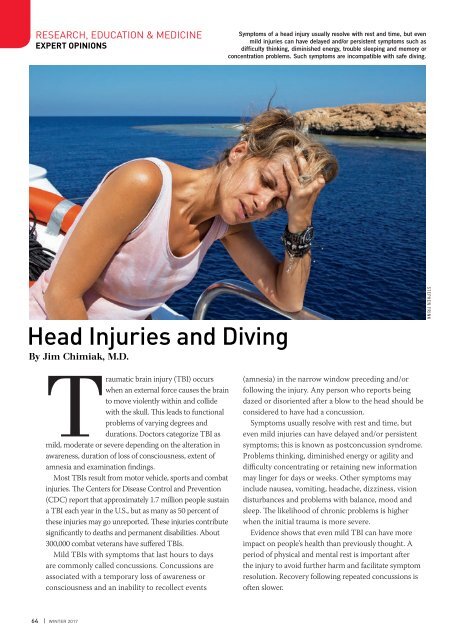AD 2017 Q1
Alert Diver is the dive industry’s leading publication. Featuring DAN’s core content of dive safety, research, education and medical information, each issue is a must-read reference, archived and shared by passionate scuba enthusiasts. In addition, Alert Diver showcases fascinating dive destinations and marine environmental topics through images from the world’s greatest underwater photographers and stories from the most experienced and eloquent dive journalists in the business.
Alert Diver is the dive industry’s leading publication. Featuring DAN’s core content of dive safety, research, education and medical information, each issue is a must-read reference, archived and shared by passionate scuba enthusiasts. In addition, Alert Diver showcases fascinating dive destinations and marine environmental topics through images from the world’s greatest underwater photographers and stories from the most experienced and eloquent dive journalists in the business.
You also want an ePaper? Increase the reach of your titles
YUMPU automatically turns print PDFs into web optimized ePapers that Google loves.
RESEARCH, EDUCATION & MEDICINE<br />
EXPERT OPINIONS<br />
Symptoms of a head injury usually resolve with rest and time, but even<br />
mild injuries can have delayed and/or persistent symptoms such as<br />
difficulty thinking, diminished energy, trouble sleeping and memory or<br />
concentration problems. Such symptoms are incompatible with safe diving.<br />
Head Injuries and Diving<br />
By Jim Chimiak, M.D.<br />
STEPHEN FRINK<br />
PHOTO CREDIT<br />
Traumatic brain injury (TBI) occurs<br />
when an external force causes the brain<br />
to move violently within and collide<br />
with the skull. This leads to functional<br />
problems of varying degrees and<br />
durations. Doctors categorize TBI as<br />
mild, moderate or severe depending on the alteration in<br />
awareness, duration of loss of consciousness, extent of<br />
amnesia and examination findings.<br />
Most TBIs result from motor vehicle, sports and combat<br />
injuries. The Centers for Disease Control and Prevention<br />
(CDC) report that approximately 1.7 million people sustain<br />
a TBI each year in the U.S., but as many as 50 percent of<br />
these injuries may go unreported. These injuries contribute<br />
significantly to deaths and permanent disabilities. About<br />
300,000 combat veterans have suffered TBIs.<br />
Mild TBIs with symptoms that last hours to days<br />
are commonly called concussions. Concussions are<br />
associated with a temporary loss of awareness or<br />
consciousness and an inability to recollect events<br />
(amnesia) in the narrow window preceding and/or<br />
following the injury. Any person who reports being<br />
dazed or disoriented after a blow to the head should be<br />
considered to have had a concussion.<br />
Symptoms usually resolve with rest and time, but<br />
even mild injuries can have delayed and/or persistent<br />
symptoms; this is known as postconcussion syndrome.<br />
Problems thinking, diminished energy or agility and<br />
difficulty concentrating or retaining new information<br />
may linger for days or weeks. Other symptoms may<br />
include nausea, vomiting, headache, dizziness, vision<br />
disturbances and problems with balance, mood and<br />
sleep. The likelihood of chronic problems is higher<br />
when the initial trauma is more severe.<br />
Evidence shows that even mild TBI can have more<br />
impact on people’s health than previously thought. A<br />
period of physical and mental rest is important after<br />
the injury to avoid further harm and facilitate symptom<br />
resolution. Recovery following repeated concussions is<br />
often slower.<br />
64 | WINTER <strong>2017</strong>









